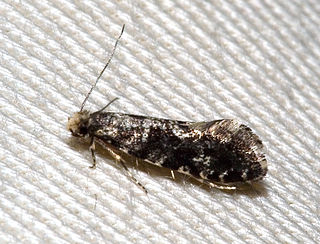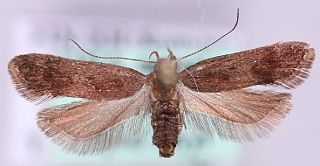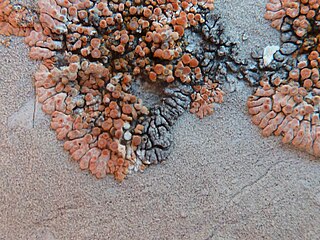
Tineidae is a family of moths in the order Lepidoptera described by Pierre André Latreille in 1810. Collectively, they are known as fungus moths or tineid moths. The family contains considerably more than 3,000 species in more than 300 genera. Most of the tineid moths are small or medium-sized, with wings held roofwise over the body when at rest. They are particularly common in the Palaearctic, but many occur elsewhere, and some are found very widely as introduced species.
Clothes moth or clothing moth is the common name for several species of moth considered to be pests, whose larvae eat animal fibres (hairs), including clothing and other fabrics.

Anacampsis is a worldwide genus of moth with most found in the nearctic and neotropical regions. It is in the family Gelechiidae. The larvae feed on a range of deciduous trees and shrubs in a rolled or folded leaf, or spun shoot.
Schistophila is a genus of moths in the family Gelechiidae.
Lateantenna is a genus of moths in the family Blastobasidae. It contains the single species Lateantenna fuscella, which is found in western Pakistan.

The brown-dotted clothes moth is a species of tineoid moth. It belongs to the fungus moth family (Tineidae), and therein to the nominate subfamily Tineinae. It is the type species of its genus Niditinea.

Diatraea is a genus of moths of the family Crambidae.
Tothia is a genus of fungi in the Microthyriaceae family; according to the 2007 Outline of Ascomycota, the placement in this family is uncertain. This is a monotypic genus, containing the single species Tothia fuscella.

Niditinea is a genus of the fungus moth family, Tineidae. Therein, it belongs to the nominate subfamily, Tineinae.
Caviana is a monotypic snout moth genus described by Herbert H. Neunzig and L. C. Dow in 1993. Its only species, Caviana fuscella, described in the same publication, is found in Belize.

Eudonia phaeoleuca is a species of nocturnal moth in the family Crambidae.

Symmoca is a genus of moths in the family Autostichidae.

Anacampsis fuscella is a moth of the family Gelechiidae. It is found in Sweden, Finland and Russia.
Scrobipalpa rebeli is a moth of the family Gelechiidae. It is found in Austria, Italy, Ukraine and the Krasnoyarsk region in southern Siberia. It is also present in China (Shaanxi) and Japan.
Cuprina fuscella is a moth in the Stathmopodidae family. It was described by Sinev in 1988. It is found in Austria and eastern Siberia.
Schistophila laurocistella is a moth of the family Gelechiidae. It is found in Morocco, Portugal, Spain and southern France.
Symmoca fuscella is a moth in the family Autostichidae. It was described by Hans Georg Amsel in 1959 and is found in Iraq.
Ricotta di fuscella is a fresh cow's-milk cheese made in the Campania region of Italy and is recognized as a PAT product.

Verrucula is a genus of lichenicolous (lichen-dwelling) lichens in the family Verrucariaceae. Species in the genus are parasitic on saxicolous (rock-dwelling), crustose lichens, including Xanthoria elegans as well as lichens from genus Caloplaca that contain chemical substances called anthraquinones.







